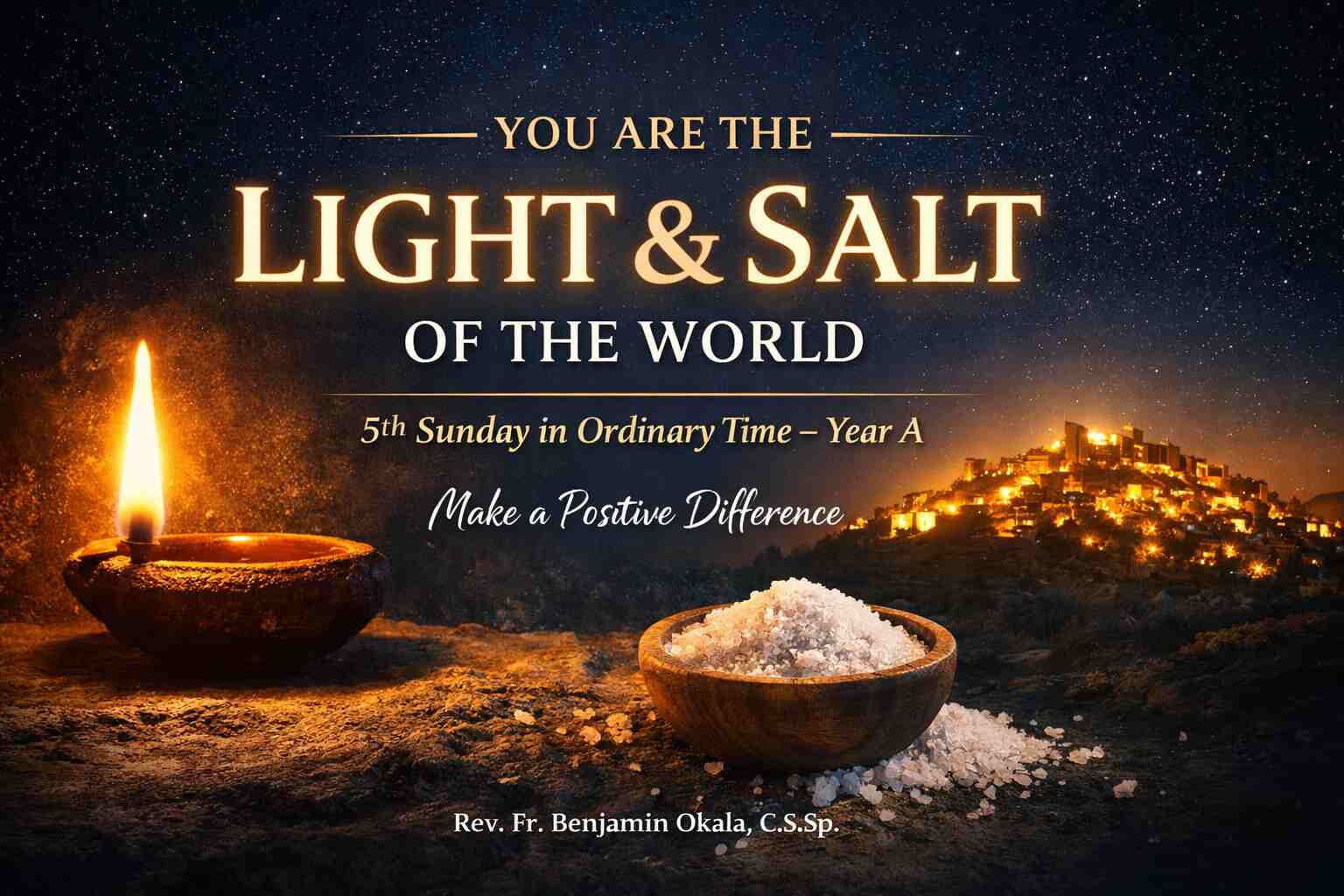HOMILY OF THE 15TH SUNDAY IN ORDINARY TIME, YEAR A
First Reading: Isaiah 55:10–11; Second Reading: Romans 8:18–23; Gospel: Matthew 13:1–9.
In our fast-paced and ever-evolving contemporary society, the Bible, the sacred Word of God, is frequently relegated to the periphery of daily life. Amidst the hustle and bustle of our daily lives, this timeless treasure of wisdom and divine guidance that has the power to transform lives, bring hope in times of despair, and guide humanity on the path of righteousness is often trivialized and taken for granted.
Unfortunately, a good number of people have unreceptive attitudes and cold dispositions toward the word of God. They can spend countless hours engrossed in social media content but find it difficult to give attention for at least five minutes to studying the Word of God. In this homily, we shall explore the profound meaning of the Word of God, discover how it can provide spiritual nourishment, and also reveal captivating insights into its significance and power in our lives.
The Creative Power of God’s Word as a Rainfall

In the first reading, we encounter a beautiful analogy that portrays the life-giving nature as well as the power of the Word of God in bringing about its intended outcomes. The prophet Isaiah compares God’s Word to the rain that falls from heaven, watering the earth and causing it to bring forth life; it does not return to the heavens without bearing fruits. Just as the rain and snow do not return to the heavens without watering the earth, so too does the Word of God accomplish its purpose, never returning void (Isaiah 55:11).
Hence, we are invited to embrace the promises of God’s Word, which are not mere empty words but living and active, carrying the power to transform our lives, heal wounds, nourish our souls, and bring forth abundant spiritual growth.
The Parable of the Sower and the Fertile Soil of Our Hearts

The Gospel reading presents us with the parable of the Sower, a timeless lesson on the receptiveness of our hearts to the Word of God. Through this parable, Jesus Christ illustrates the power of the Word of God and its influence on the spiritual success of individuals. The Sower scatters seeds, symbolizing the Word of God, which fall on different types of soil, representing the conditions of human hearts.
Unfortunately, many individuals spend countless hours engrossed in social media content yet struggle to dedicate at least five (5) minutes to studying the Word of God. What an irony! Yet within the pages of the Bible lies a profound source of spiritual nourishment, consolation, and transformation. This disparity is concerning, for the benefits of studying the Word of God are immeasurable.
Lessons from the Parable of the Sower

1. Embracing the Fertile Soil of Our Hearts:
The first lesson we can learn from the Parable of the Sower is the importance of cultivating a heart that is receptive to God’s Word. Just as fertile soil allows seeds to take root and grow, a heart open to God’s teachings allows His Word to flourish within. So, we must create space in our lives for prayer, reflection, and meditation, nurturing the fertile soil of our hearts (Luke 8:15).
2. Navigating the Thorns of Distractions:
Another aspect highlighted in the parable is the presence of thorns that choke the growth of the seeds. These thorns represent the distractions and temptations of the world that can hinder our spiritual growth. We must identify and remove these thorns from our lives, making room for God’s Word to flourish and bear fruit (Matthew 13:7).
3. Cultivating the Patience of the Seedling:
The parable also teaches us about the importance of patience and perseverance in our spiritual journey. Just as a seed takes time to grow into a healthy plant, our faith and relationship with God require nurturing and patience. We must trust in His timing and continue to cultivate our spiritual lives, even when we face challenges or setbacks (Galatians 6:9).
4. The Transformative Power of God’s Word:
The Parable of the Sower reminds us of the transformative power of God’s Word (Hebrews 4:12). When we allow His teachings to take root in our hearts, they have the potential to change us from within (Romans 1:16). The seed of faith strengthens our relationship with God; the seed of hope illuminates our path in life; and the seed of love bears fruit in our actions toward others.
5. Embracing an Abundant Life:
By embracing the lessons of the Parable of the Sower, we can experience abundant life (John 10:10). Letting go of fear and doubt, we learn to trust in God’s providence and His plan for our lives. We sow seeds of compassion and kindness, spreading love and making a positive impact on those around us. In return, we reap the harvest of joy and gratitude, finding fulfillment in our spiritual growth.
The Word of God: A Consolation in Times of Difficulty

In the second reading, St. Paul affirms that the Word of God is a source of consolation, particularly in times of difficulty. Of course, the Word of God is a powerful and reassuring presence that offers solace and hope, even amidst life’s most challenging moments. He emphasizes that the present sufferings cannot be compared to the future glory that will be revealed to us.
Benefits of the Power of the Word of God
- The Word of God provides guidance and direction: In a world filled with confusion and uncertainty, the Word of God offers a steady and unwavering compass to navigate life’s challenges. The psalmist declares, “Your word is a lamp for my feet, a light on my path” (Psalm 119:105).
- The Word of God brings comfort and solace: In time of despair, the Word of God offers hope, peace, and reassurance that we are never alone. St. Paul reminds us, “For everything that was written in the past was written to teach us so that through the endurance taught in the Scriptures and the encouragement they provide, we might have hope” (Romans 15:4).
- The Word of God nourishes our souls: Just like our physical bodies require sustenance, our spiritual well-being is dependent on the nourishment provided by the Word of God. Jesus Christ states categorically that “Man shall not live by bread alone, but by every Word that proceeds out of the mouth of God” (Matthew 4:4).
- The Word of God empowers us to live righteous lives: As the scripture says, “All Scripture is God-breathed and is useful for teaching, rebuking, correcting, and training in righteousness” (2 Timothy 3:16). Hence, regular study of the Word of God equips us with the wisdom and discernment necessary to make choices that align with God’s will.
Conclusion:
From our reflections so far, we have observed that the Word of God holds immeasurable power and offers countless blessings to those who engage with it. The first reading reveals the Power of the Word of God, which, like rain, cannot return void unless it has fulfilled its purpose. It holds immeasurable strength, offering fulfillment, consolation, and spiritual success. When we reflect and embrace the lessons inherent in the Parable of the Sower and by cultivating receptive hearts, we sow the seeds of abundance in our lives.
Moreover, since we are living in a world filled with distractions, it is vital for us to prioritize studying the Word of God at all times, allowing it to guide us and filter out misleading influences or distractions accruing from modern technology, which often hinder our spiritual growth. Therefore, let us strive to make our hearts fertile soil, free from distractions, and open to the transformative power of God’s Word. Through faith, hope, and love, we can sow the seeds of abundance and reap a bountiful harvest of joy, gratitude, and spiritual nourishment.
Prayer:
May the Holy Spirit give you the grace to always cultivate a receptive heart like fertile soil, free from distractions, and be open to the transformative power of God’s Word and thus reap a bountiful harvest of joy, gratitude, and spiritual nourishment, through Jesus Christ, Our Lord, Amen.
Peace of Christ be with you…
Rev. Fr. Ben Okala, C.S.Sp.



